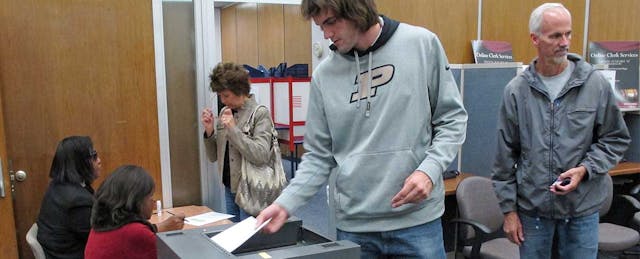Today is Election Day in the U.S. For this installment of our Pandemic Campus Diaries podcast series, we are focusing on how the election and social unrest have been playing out on campuses during this pandemic semester. Students seem to be voting this election season like never before. In fact there are signs we are heading for record youth turnout.
“Everyone's checking their mail, saying ‘Is my ballot here yet?’” says Josh Freson, a freshman at Syracuse University. This past week he mailed in his vote in his very first presidential election—and it’s the talk of his dorm.
“We all are motivating each other to vote and care about voting, whether we're political people or not,” he adds. “I'm not the most political person at all, but I know how important it is to vote.”
In the county where Texas State University sits, for instance, more people have voted early this year than cast ballots in the county during the entire 2016 election cycle. “So we have some really awesome and politically engaged students,” says Texas State senior lecturer Rachel Davenport, whose students have been trading information about where to get ballots and other details in the chat discussions of her Zoom classrooms.
Of course, just because college students are voting doesn’t mean they are all voting for the same candidate. Natalie Richardi, a junior at Chapman University, says seeing the political views of her friends and contacts on social media has been stressful.
“I can't even tell you how many of my own friends that I've had to mute because I just can't take seeing one more thing that is so hateful,” she says. “I have some of my closest friends posting, just awful things saying, ‘If you don't believe the way I do …” and then followed by a lot of expletives. And honestly, it feels like nobody wants to have a conversation, and everybody just wants to come at each other and fight.”
In normal times, the college classroom would be a place to have debates about ideologies and political issues without all the emotion and name-calling. But when classrooms are online, it can be harder to maintain civility, or even just read the room. That's definitely been the experience for Jeremi Suri, a professor of public affairs and history at the University of Texas at Austin.
“It is very different,” he says. “I have graduate students as well as undergraduates who are in my class week after week in my Zoom class who I've never actually been in the same room with. I don't know how tall they are. I don't know whether they wear sneakers or shoes or Tevas. I don't know these things about them.” He says informal cues are especially important for figuring out how a discussion with students of potentially emotional issues is going.
“We are attuned as educators and as citizens really to pay attention to body language, and we're getting a very truncated version of it—sometimes a distorted version,” he says. “Someone can look like they are comfortable with something when they're not, when all you're seeing is their face.”
His advice to educators, though, is to lean into discussions of controversial topics, to model how to have productive political discussions.
“We're in an environment where people are hearing opinions all the time that are not anchored in fact,” he says. “It’s always been our job as scholars—and it's even more important now in this environment—to teach our students how to get beyond the rhetoric, to know what fact-based there is behind to assess critically the information and for us to create a culture of that. I'm very careful now, not even to spout off opinions on sports, unless I have some factual basis behind that or to differentiate that, you know, I'll say I'm a diehard Packers fan, and no matter what Aaron Rogers does, I'm going to say he's the best quarterback, but that is not a scholarly opinion. I'm going to differentiate that from an analysis of Packers football.”
Hear what other students and professors are saying about the campus environment during this election in the EdSurge Podcast.
Listen to this week’s episode on Apple Podcasts, Overcast, Spotify, Stitcher, Google Play Music, or wherever you listen to podcasts, or use the player on this page. Below are lightly edited highlights from the conversation.
This is the sixth episode of an eight-part podcast series. Find the complete series on the Pandemic Campus Diaries page.


